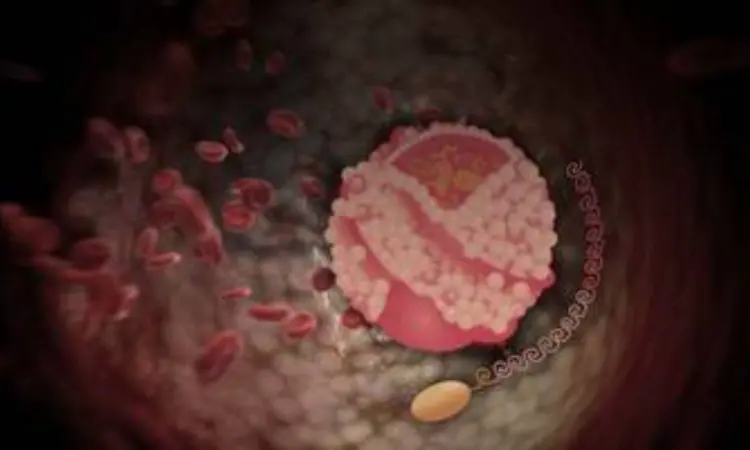- Home
- Medical news & Guidelines
- Anesthesiology
- Cardiology and CTVS
- Critical Care
- Dentistry
- Dermatology
- Diabetes and Endocrinology
- ENT
- Gastroenterology
- Medicine
- Nephrology
- Neurology
- Obstretics-Gynaecology
- Oncology
- Ophthalmology
- Orthopaedics
- Pediatrics-Neonatology
- Psychiatry
- Pulmonology
- Radiology
- Surgery
- Urology
- Laboratory Medicine
- Diet
- Nursing
- Paramedical
- Physiotherapy
- Health news
- Fact Check
- Bone Health Fact Check
- Brain Health Fact Check
- Cancer Related Fact Check
- Child Care Fact Check
- Dental and oral health fact check
- Diabetes and metabolic health fact check
- Diet and Nutrition Fact Check
- Eye and ENT Care Fact Check
- Fitness fact check
- Gut health fact check
- Heart health fact check
- Kidney health fact check
- Medical education fact check
- Men's health fact check
- Respiratory fact check
- Skin and hair care fact check
- Vaccine and Immunization fact check
- Women's health fact check
- AYUSH
- State News
- Andaman and Nicobar Islands
- Andhra Pradesh
- Arunachal Pradesh
- Assam
- Bihar
- Chandigarh
- Chattisgarh
- Dadra and Nagar Haveli
- Daman and Diu
- Delhi
- Goa
- Gujarat
- Haryana
- Himachal Pradesh
- Jammu & Kashmir
- Jharkhand
- Karnataka
- Kerala
- Ladakh
- Lakshadweep
- Madhya Pradesh
- Maharashtra
- Manipur
- Meghalaya
- Mizoram
- Nagaland
- Odisha
- Puducherry
- Punjab
- Rajasthan
- Sikkim
- Tamil Nadu
- Telangana
- Tripura
- Uttar Pradesh
- Uttrakhand
- West Bengal
- Medical Education
- Industry
Extreme lipoprotein(a) linked with increased risk of cardiovascular disease: Study

Israel: Extreme Lipoprotein (a) levels are linked with 2.5 times increased risk of atherosclerotic cardiovascular disease (ASCVD) compared to normal range Lp(a), a recent study has shown. The study was published online in March 2023 issue of the International Journal of Cardiology Cardiovascular Risk and Prevention.
The study, which included a nationwide cohort of patients from a single healthcare provider, also showed that lipid-lowering treatment is more intense in CAD patients with extreme Lp(a). The findings support recent recommendations to measure Lp(a) once in each person's lifetime. Still, combination therapies remain underused, and there are suboptimal attainment rates of LDL-C.
Lp(a) is comprised of an LDL (low-density lipoprotein)-like particle consisting of apoB-100 (apolipoprotein B-100) linked to a glycoprotein named apo(a) by a disulfide bond that shares homology with plasminogen. Lp(a) is considered prothrombotic, proinflammatory, and proatherogenic, with cumulative data indicating a causal relationship with ASCVD.
Statins do not reduce Lp(a) levels, and the clinical benefits of Lp(a) reduction have yet to be proven. PCSK9 inhibitors cause a decrease in Lp(a) concentration by up to 20–25%, along with LDL-C lowering. Increased Lp(a) levels may identify people with a more significant absolute benefit from PCSK9 inhibition. RNA-based therapies that inhibit apo(a) synthesis and can reduce Lp (a) by 70-90% are underway. These developments led to the recommendation of measuring lipoprotein(a) once in a lifetime to identify individuals at high risk of ASCVD.
Against the above background, Barak Zafrir from the Israel Institute of Medicine, Israel, and colleagues aimed to analyze the clinical features of patients with extreme Lp(a) in a case-control, cross-sectional study of a single healthcare organization between 2015 and 2021.
The study included Individuals with extreme Lp(a) > 430 nmol/L (53 of 3900 tested patients). They were compared to age- and sex-matched controls with a normal Lp(a) range. The mean patient age was 58 ± 14 years (49% women).
The key findings of the study were as follows:
- Myocardial infarction (47.2% vs. 18.9%), coronary artery disease (CAD) (62.3% vs. 28.3%), and peripheral artery disease (PAD) or stroke (22.6% vs. 11.3%) were more prevalent in patients with extreme than normal range Lp(a).
- The adjusted odds ratio associated with extreme compared to normal range Lp(a) was 2.50 for myocardial infarction, 2.20 for CAD, and 2.75 for PAD or stroke.
- A high-intensity statin plus ezetimibe combination was issued by 33% and 20% of CAD patients with extreme and normal range Lp(a), respectively.
- In patients with CAD, low-density lipoprotein cholesterol (LDL-C) <55 mg/dL was achieved in 36% of those with extreme Lp(a) and 47% of those with normal range Lp(a).
"Our findings showed that ASCVD, particularly CAD, was remarkably more prevalent in people with extreme Lp(a) levels compared to matched controls with normal range Lp(a), supporting recent recommendations of Lp(a) measurement once in each person's lifetime," the researchers wrote.
Despite the availability of several therapeutic groups for cholesterol reduction, there is a suboptimal attainment rate of LDL-C treatment goals due to the minimal use of PCSK9 inhibitors and underutilization of combination lipid-lowering therapy, which may impart clinical benefit in those with elevated Lp(a).
Reference:
Zafrir, B., Aker, A., & Saliba, W. (2023). Extreme lipoprotein(a) in clinical practice: A cross sectional study. International Journal of Cardiology Cardiovascular Risk and Prevention, 16, 200173. https://doi.org/10.1016/j.ijcrp.2023.200173
Dr Kamal Kant Kohli-MBBS, DTCD- a chest specialist with more than 30 years of practice and a flair for writing clinical articles, Dr Kamal Kant Kohli joined Medical Dialogues as a Chief Editor of Medical News. Besides writing articles, as an editor, he proofreads and verifies all the medical content published on Medical Dialogues including those coming from journals, studies,medical conferences,guidelines etc. Email: drkohli@medicaldialogues.in. Contact no. 011-43720751


